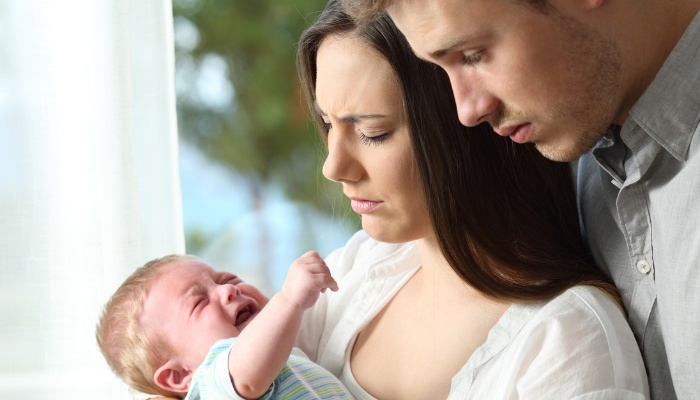Certain infants may not enjoy being snuggled due to the confined feeling that comes with cuddling, causing them to feel physically uneasy.
Others might prefer to be active, be hypersensitive to touch, or be slow to develop affectionate behaviors.
Instead of snuggling, bond with your baby through interaction, routine eye contact, play, baby-wearing, massage, and other loving gestures.
Note that, in some cases, rejecting cuddles may be a sign of developmental issues when accompanied by other symptoms.
Penelope Leach, Ph.D, advises:
“Try lying on a bed or a rug on the floor and leaning right over, so he can study your face from close up while you talk and smile.
He’ll probably be even more delighted if you’ll show your physical affection in physical play, bicycling his legs and blowing raspberries on his tummy.”
A dislike of snuggling is not a rejection of you. Rather, it points to your child’s unique development style, personality, comfort, and many other factors.
I experienced this personally with one of my little ones. For the first 10 months or so, my baby showed no interest at all in snuggling.
Being held for feedings was fine, but cuddling resulted in squirming and obvious discomfort.
Then, one day everything changed, and my baby all of a sudden craved my touch and adored leaning in close to my body for quality snuggle time! Don’t lose hope!
Table of Contents
Why Some Babies Do Not Like To Snuggle
There are several reasons why some babies aren’t always keen to snuggle up with you, and most of them are not a cause for concern.
Let’s look into some of the possible explanations for this behavior.
1. Prefer To Be Active
Some babies simply love to interact with their environment and crave stimulation through movement, which unfortunately puts cuddle time with mom and dad on the back burner.
The upside to this, though, is that an active baby often equals a very happy and healthy one!
According to the PBC Expo (Pregnancy, Baby, and Children):
“Early movement has a profound impact on a baby’s brain growth and neurological organization, influencing how well they behave, read, and learn, as well as stimulating emotional growth.”
In short, don’t feel rejected if they want a little extra time engaging in tummy play on a mat or song/rhyme time — you are helping them grow into smart, happy individuals.
2. Naturally Not as Affectionate as Others
It’s helpful to remember that every child is unique, so just because they do not express or receive affection with the intensity we might expect, this does not mean they are incapable of doing so.
(Don’t we all have that one friend/family member who prefers a handshake over a hug? We’re all different!)
3. Slower To Develop Feelings of Affection
In the same way that some children start talking later than others, some babies are slower to develop affectionate behaviors and feelings compared to others.
Just because your little one isn’t yet displaying affection, it doesn’t mean that they never will.
Be patient and continue to bond with your baby, and one day you’ll be rewarded with a huge hug and a sloppy, wet kiss.
4. They Have Had Enough
Consider how often your baby is held and how many people interact with them each day. Perhaps your little one has simply reached their limit.
It doesn’t take much to overstimulate a baby, and one or two quick snuggles might be more than enough.
5. Rejection Due to Jealousy
Sometimes there can be an emotional reason for the lack of cuddling. The arrival of a new family member, perhaps, may lead to babies rejecting physical contact.
This behavior is often temporary and resolved by devoting moments of exclusive attention to the child.
6. Hypersensitivity To Being Touched
Your child could be experiencing Sensory Processing Disorder or SPD, which often manifests in disliking diaper changes, changing into new clothes, and even being cuddled or swaddled for long periods.
Many symptoms accompany SPD besides touch sensitivity, so consult this checklist for clarity.
7. Too Warm
Temperature plays a big role in overstimulation for babies, according to Healthline, so rejecting snuggle time can simply be a case of feeling uncomfortably warm.
Sleep consultants Fern and Dawn at The Big Sleep Co. recommend “placing a muslin between you and baby to avoid becoming too hot and sticky” or “laying down next to them on a flat, firm surface and rubbing their back.”
8. Illness
Is there a chance your baby is coming down with something? We all get a little grumpy or moody when we don’t feel well.
If the dislike of snuggles occurred all of a sudden, check for signs of illness before assuming your baby no longer loves you.
9. Naturally Independent
Personality is evident even at a very young age. Your little one might have a very independent nature and prefer to be left alone unless he needs something.
10. Developmental Issue
A lack of affection can sometimes hint at a developmental issue.
In addition to Sensory Processing Disorder, persistent rejection of cuddles could be linked to delayed language skills, hyperactivity, and delayed movement skills.
These are caused by differences in the brain and simply mean that your child responds to attention (and therefore affection), play, and learning differently.
Disliking snuggles is only one aspect of these developmental disorders though, so it’s important to speak to a pediatrician about your concerns.

When To Be Concerned
If a child’s disinterest in snuggles persists beyond the age of 12 months, parents should then begin looking out for other symptoms, such as poor eye contact, delayed speech, etc., to determine whether or not this could be an issue.
When expected developmental milestones are delayed in your child or your baby stops doing the things they used to do, this is usually a good time to speak with their doctor.
How To Bond With a Baby Who Does Not Like Snuggles
Bonding with a baby who isn’t particularly fond of snuggles can be a unique but equally rewarding experience.
It’s important to remember that every child is different, and finding alternative ways to connect can deepen your relationship.
Here are some effective strategies to help you forge a strong bond with your independent little one:
- Respect Their Preferences: Understand that not all babies enjoy cuddling, and that’s perfectly normal. Respect their need for personal space, and be attentive to their cues.
- Engage in Interactive Play: Opt for activities that encourage interaction and engagement. Simple games like peek-a-boo, patty cake, or finger painting can be delightful ways to connect.
- Establish Eye Contact: Hold your baby in your arms or have them in a secure position, and engage in prolonged eye contact. This simple act can convey a strong sense of connection.
- Baby-Wearing: Consider using a baby carrier or sling. This way, your baby can still be close to you while having the freedom to look around and explore.
- Explore the Outdoors: Take your baby for walks in a stroller or even use a baby carrier for hikes. Nature provides an excellent backdrop for exploration and bonding.
- Read Together: Choose colorful picture books, and spend quality time reading to your baby. This not only encourages language development but also fosters a sense of closeness.
- Gentle Massage: Some babies may not enjoy tight cuddles but might appreciate a soothing massage. Use gentle strokes to help them relax and feel secure.
- Respond Promptly to Their Needs: Being attuned to your baby’s signals and promptly meeting their needs fosters a sense of security and trust.
- Create a Routine: Establishing a predictable routine can provide a sense of stability and comfort for your baby, enhancing their overall sense of security.
- Provide Independent Play Opportunities: Set up a safe play area where your baby can explore on their own. Be nearby for supervision and encouragement, but allow them to lead the play.
- Be Patient and Persistent: Building a bond with a baby who prefers independence may take time. Be patient, stay attuned to their cues, and continue offering opportunities for connection.
- Celebrate Milestones: Acknowledge and celebrate your baby’s developmental milestones. This reinforces their sense of accomplishment and strengthens the bond they share with you.
Age Babies Normally Start Cuddling
Generally, babies will actively participate in cuddling between the ages of six to 12 months.
Generally, affectionate behavior will continue to increase after their first birthday.
However, some children may not communicate physically until they become more vocal and start walking (up to 18 months).
Many parents who were denied snuggles in the first year or so suddenly find their child has made a complete 180 and all of a sudden is extremely affectionate.
Babies and Kisses
Yes, many babies love the interaction and affection that kissing brings as it plays an important role in communication and social development.
If babies don’t like kisses, they make it clear by crying or pulling away.
Not liking kisses could stem from a previous unpleasant encounter like a scratchy beard or bad breath.
When Babies Start To Give Hugs and Kisses
Babies typically begin to give voluntary hugs and kisses between the ages of 16 and 18 months, though this can be earlier or later for some children.
It’s around this age that children wish to assert their independence while simultaneously reaching for your reassurance and affection.
Baby Pushes Away When Held
Pushing away can indicate stress, discomfort, or preferring to be free, and it can sometimes be linked to infant reflux.
If your baby pushes away when they’re in your hold, there are other forms of affection you can share with them.
Interact with them during tummy time, enjoy face-to-face “conversations,” gently stroke their cheeks, encourage lots of eye contact, play with them, give them a massage, etc.
Lack of Affection as It Relates to Autism
On its own, a lack of affection is not necessarily a sign of autism as Autism Spectrum Disorder (ASD) considers all aspects of your child’s communication and how they relate to the world.
Common signs of autism in babies are things like:
- A decline in eye contact
- Little gesturing or pointing
- Little to no response to their name
- Delayed speech
- Displaying less emotion in facial expressions
- Regression (losing the skills they acquired at an earlier stage)
Mom of three (including identical twin boys), wife, and owner of Parents Wonder. This is my place to share my journey as a mother and the helpful insights I learn along the way.

